Black Lives Matter: Can viral videos stop police brutality?
- Published
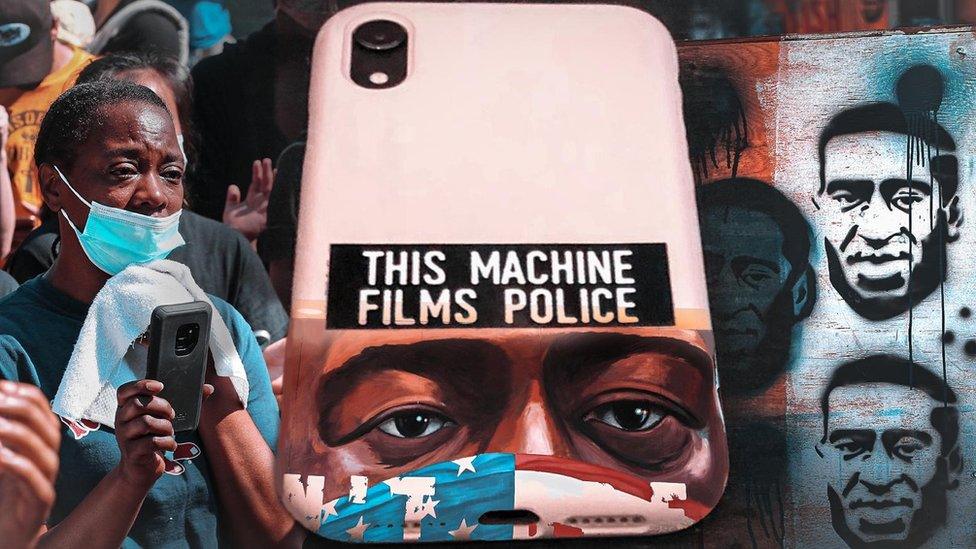
George Floyd's death might not have caused global outrage if it hadn't been filmed. But do viral videos actually reduce police abuse?
"They killed this man, bro. He was crying, telling them 'I can't breathe.'"
For more than five minutes Darnella Frazier rambled on Facebook Live about the killing she had witnessed - repeating over and over again that she had video evidence.
A short time later on that night in late May, Frazier uploaded a video of the death of George Floyd - including the eight minutes and 46 seconds in which Derek Chauvin forced his knee onto his neck.
Had it not been for that video and other footage from bystanders, it's likely that Mr Floyd's death would never have sparked global outrage. But does that make viral videos, shot on the phone in your hand, an effective check on police abuse?
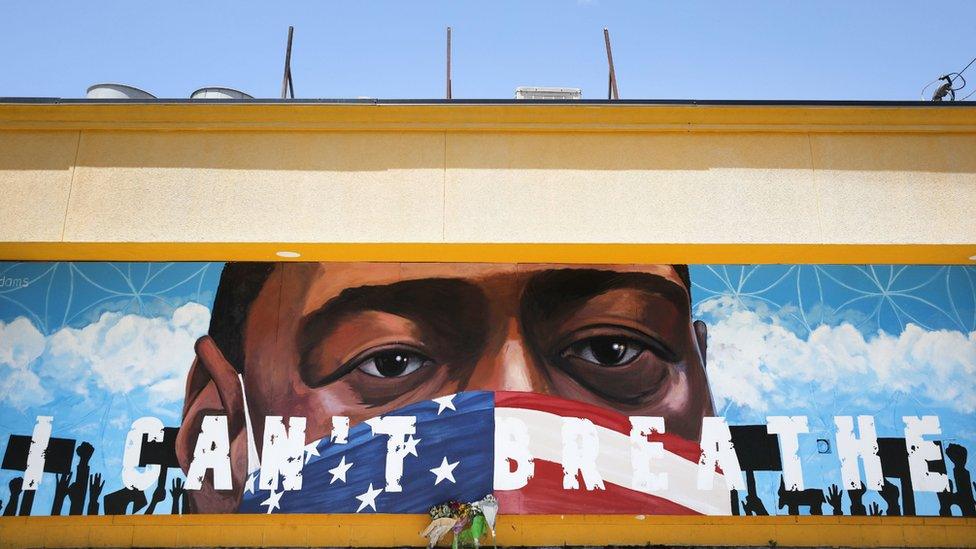
Why was this one different?
Darnella Frazier's video was far from the first viral footage to document police brutality.
In 2016, Philando Castile died after being shot by police in his car. Like the death of George Floyd, Mr Castile's death also happened in Minnesota - in Falcon Heights, just a short drive from Minneapolis. His girlfriend live-streamed the immediate aftermath on Facebook, including shots of Castile's lifeless body in the driver's seat.
The day before, Alton Sterling was killed by two police officers outside a convenience store in Louisiana. Video evidence filmed on a smartphone was posted online.
In 2014, footage captured events leading up to the deaths of Eric Garner in New York and Laquan McDonald in Chicago. In fact, many cite the beating of Rodney King by Los Angeles police officers, captured on videotape in 1991, as one of the first "viral" police abuse videos - long before the social media era.
None of those events, however, sparked quite the same level of global outrage as the footage of George Floyd.
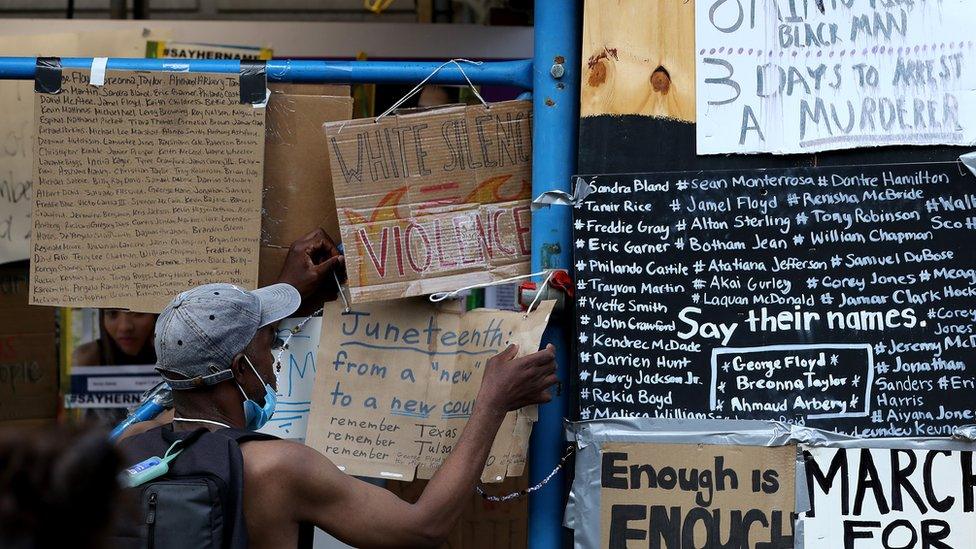
Protest signs on the streets of Minneapolis
Experts put the impact of Floyd's death down to the length of the video, combined with the specific nature of its graphic content.
"While a gunshot is very quick, it is immediately traumatic and very easy for one to look away," says Allissa Richardson, author of Bearing Witness While Black: African Americans, Smartphones, and the New Protest #Journalism.
"This video transfixed people because of the callous nature of the killing coupled with the brazen nature of the police, who knew they were being filmed and still did it anyway," she says.
Online activism
The Black Lives Matter movement started in 2013, and the deaths of Mr Garner and of Michael Brown in Ferguson, Missouri, sparked huge protests the following year.
But Ms Richardson says rather than ushering in a brand new form of activism, new technology is simply being deployed for a much older purpose.
She uses the term "black witnessing" to explain how African Americans have historically tried to record injustices, dating back to the era of slavery in pre-Civil War America, drawing inspiration from Frederick Douglass, an escaped slave who led America's abolitionist movement. In his first autobiography, Douglass documented his experiences as a slave.
"When black people are picking up their cell phones, they're not just recording in the wrong place at the right time," she says. "They're attempting to connect, historically, dots between atrocities."
Others note the defensive nature of the mobile phone.
"For African Americans, every encounter with a law enforcement officer is potentially a life and death situation," says clinical psychologist Monnica Williams. "They film these interactions for their own protection."
Watching the police
In the wake of George Floyd's killing, videos have also been used by activists to monitor the policing of protests, often in chaotic and confusing situations.
When David Frost pressed record on his phone's camera during a protest on 31 May, he thought the police had taken another life.
"I wanted as many people to see it [as possible]," he says. "I was six feet away ... when he got shot."
Mr Frost, a white man, started filming after 20-year-old Justin Howell, an African American, was shot in the head with a "less-lethal" bean bag munition in Austin, Texas. In the video, protesters were seen carrying the injured man towards police, in an attempt to get help. Then police opened fire again.
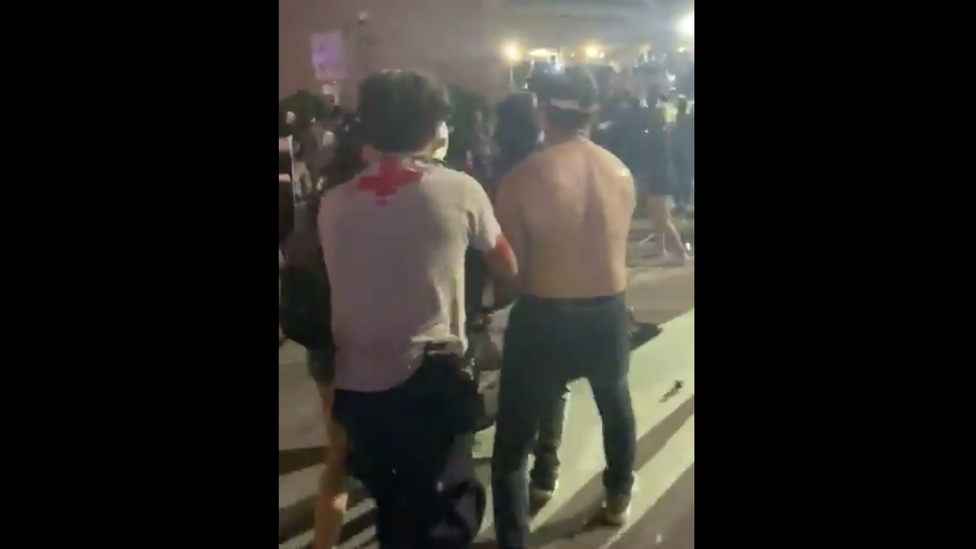
David Frost's video showed protesters carrying Justin Howell towards police.
Mr Howell suffered life-changing injuries as a result, including brain damage and a fractured skull. Mr Frost's video was viewed over 10 million times on Twitter, and was widely covered by US media.
"It wasn't until we had gotten almost three million hits that the Austin Police Department even mentioned anything," he says.
After the incident went viral, Austin police announced they would no longer be using bean bag munition for crowd control.
Justin's brother, Josh Howell, told BBC Trending: "The quickness with which the video spread on social media really added to the whole response."

Hear more about this story

Police filming
There is no single database counting the number of people killed by police in America each year, but data collected by the independent research group Mapping Police Violence, external has found that on average nearly 1,100 people have been killed by police since 2013.
While most are white, the dead are disproportionately African American: last year they made up 24% of the total despite being 13% of the American population.
Lawyers and activists say they are seeing more video evidence in cases involving police brutality.
There is a "huge increase," in the number of clients who are coming in with filmed evidence, says Tracey Brown, who heads the civil rights and police brutality group at the Cochran Firm in New York City.
That marks a change, she says, from the first wave of Black Lives Matter protests. Then, many activists pushed the idea of police body cams and dashcams mounted in police cars. But studies show they haven't led to a decrease in police shootings or an increase in accountability.
"In many municipalities the police officers don't get charged," Ms Brown says. She notes that in many places, it's impossible to obtain disciplinary records which contain, she says, "critical information when trying to bring charges against police officers".
And just because videos exist, it doesn't mean lawyers or the public are always able to see them.
"Police departments don't release videos until you're well into a criminal prosecution or a civil lawsuit," she says.
In one notable case, dashcam footage showing that Laquan McDonald was walking away from Chicago officers when he got shot was kept under wraps for over a year, until pressure by activists and journalists succeeded in getting it into the public domain. Officer Jason Van Dyke was eventually convicted of second-degree murder.
Ethan Zuckerman, director of the Center for Civic Media at the MIT Media Lab, says neither police cameras nor bystander footage can really be an effective check on abuse.
"Our legal system gives so much flexibility to the police to use violence in the course of carrying out their duties," he says.
"Imagery may matter as far as getting people out into the streets, but it does not matter as far as preventing police from using violence in the first place."
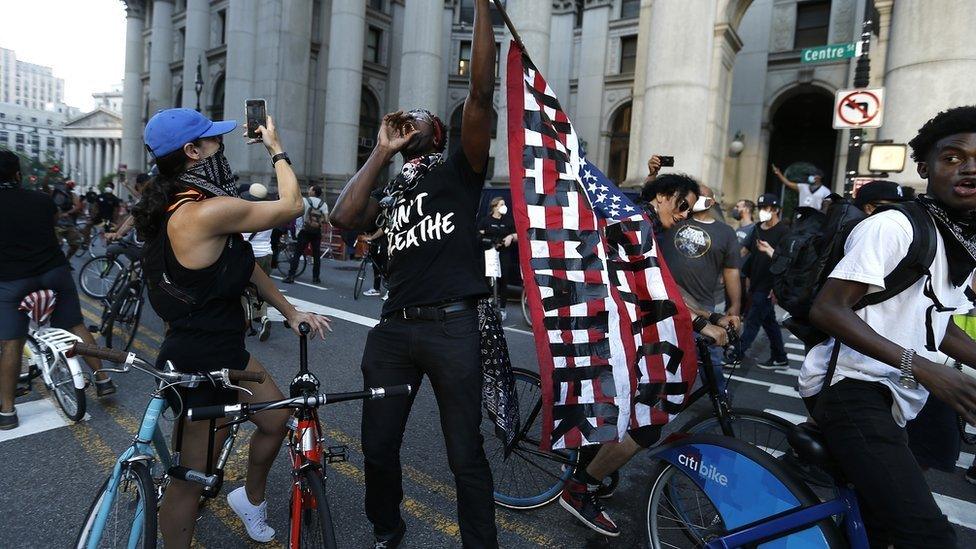
Activists at a Black Lives Matter rally in New York
What next?
Darnella Frazier's footage of George Floyd's death wasn't the first viral video documenting a police killing - nor was it the last. While such videos may have limited impact in actually stemming violence, African Americans and others will continue to document abuses for reasons beyond simple prevention.
"Black people pick up their cell phones to do two things," says Alissa Richardson, "to say to the person who is dying, 'I will not let you die alone', and 'I will carry the message forward to your family - because I know that nobody would believe what happened to you here today.'"
Is there a story we should be investigating? Email us, external
Follow us on Twitter @BBCtrending, external or on Facebook, external.